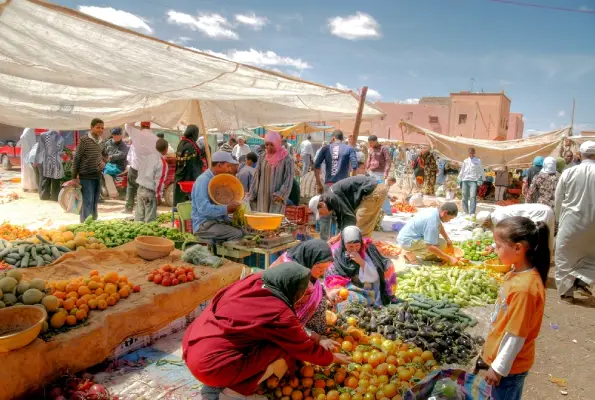According to the Heritage Foundation’s 2024 Index of Economic Freedom, Morocco has emerged as the most economically free nation in North Africa. The yearly report, which is currently in its 30th edition, assesses 184 countries’ economic freedom globally using 12 quantitative parameters that are broadly divided into four categories: open markets, government size, regulatory effectiveness, and rule of law.
Morocco ranked ninth out of 14 countries in the Middle East and North Africa (MENA) region and 101st internationally, with an overall economic freedom score of 56.8 out of 100.
Morocco continues to top the region in North Africa, surpassing its neighbours Algeria (164th), Tunisia (150th), Egypt (146th), and Mauritania (110th), even though its score dropped by 1.6 points from 2023. There was insufficient data to put Libya on the list.
According to a Heritage Foundation analysis, “economic changes that stimulate private-sector dynamism are partially responsible for Morocco’s modest but considerable improvement.”
The production base has expanded, and competitiveness has increased. Some problems call for more extensive institutional changes. The processes for establishing and registering businesses are much more efficient.
Morocco received 57.6 for property rights, 32.9 for judicial efficacy, and 33.9 for government integrity when it came to the rule of law. Morocco has a lower overall score than the rest of the world when it comes to the rule of law, but its score on property rights is higher.
Morocco scored 68.5 for corporate freedom, 48.6 for labour freedom, and 71.1 for monetary freedom in terms of regulatory effectiveness. Morocco has a higher business freedom score than the rest of the world, but the Heritage Foundation notes that the “labour market rigidity still hampers dynamic employment development, and much of the workforce remains marginalised in the informal sector.”
But the paper also emphasises that “very mild inflation has been maintained with monetary stability.”
Morocco received scores of 67.4 for trade freedom, 65.0 for investment freedom, and 70.0 for financial freedom in the open markets category.
“11.3% is the trade-weighted average tariff rate. The law generally treats domestic and foreign investors equally,” according to the paper, which continued further, “A variety of financing choices are available from the competitive financial sector, which is continually expanding. There are no restrictions on international participation by the stock exchange.”
Morocco has high corporation tax rates of 32% and high individual income tax rates of 38%, according to the Heritage Foundation. The tax burden is equivalent to 27.1% of GDP.
The average three-year government spending and budget balance is 32.6% and -6.1% of GDP, respectively. According to the report, public debt represents 71.5% of GDP.
Singapore continues to be the most economically free nation in the world, with Switzerland, Ireland, Taiwan, and Luxembourg rounding out the top five. Mauritius (19th), Botswana (36th), and Cape Verde (57th) are at the top of the African rankings, while the United Arab Emirates (22nd), Israel (26th), and Qatar (28th) lead the MENA area. In terms of economic freedom, North Korea, Cuba, Venezuela, Sudan, and Zimbabwe are still at the bottom of the list.
The 2024 Index of Economic Freedom by the Heritage Foundation emphasises how important economic freedom is to the advancement and prosperity of humanity.
“More economic freedom has a big beneficial impact on overall levels of poverty because it is one of the most effective strategies by which to alleviate poverty,” the paper added further.
Morocco Remains Economically Resilient
As per its May 2024 estimates, the International Monetary Fund (IMF) has acknowledged the resilience shown by the Moroccan economy to challenging external conditions.
Despite phenomena like water scarcity and the September 2023 earthquake, and North African country’s economic activity picked up to 3% in 2023 thanks to strong exports and a rebound of domestic demand.
As per the IMF’s Executive Board, Morocco’s economic growth is expected to gradually pick up to 3.5 % over the next few years, boosted by the continued implementation of the structural reform agenda. Inflation also fell over the course of 2023, mainly as the impact of supply shocks faded. This led Morocco’s central bank to halt the interest rate tightening cycle since June last year, after three consecutive increases from September 2022.
Morocco’s current account deficit (CAD) too has narrowed significantly. This reflects both a reduced trade deficit in goods (driven by the lower import prices of energy, raw and intermediate goods, and food items, as well as the robust performance of automotive and electronics exports), buoyant export of services (both tourism and non-tourism related), and the continued expansion of inward remittances.
The IMF has also commended Morocco’s very strong macroeconomic policies and institutional frameworks, which supported the pick-up in growth and decline in inflation.
The Fund welcomed the country’s progress in strengthening its financial supervisory and regulatory framework, hailing the North African nation’s strong commitment to implement structural reforms.
“The reform of the social protection, health, and education systems would improve fairness and quality of access and sustain human capital in the long run,” IMF noted, while adding, “Furthermore, the operationalisation of the Mohammed VI Fund and the new Charter of Investment would stimulate private investment and create sustainable jobs,” thereby stressing the importance of the efforts engaged to reduce dependence on fossil fuels, address water scarcity, and strengthen good governance.
The IMF also took a positive note of the ongoing work related to the national water program and the plans to achieve zero net emissions by 2050.



